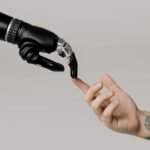Top 5 Ways Artificial Intelligence is Revolutionizing Healthcare

Introduction
Artificial Intelligence (AI) is transforming industries worldwide, and healthcare is no exception. The integration of AI in healthcare is not just an advancement; it’s a revolution that promises to enhance patient outcomes, reduce costs, and streamline operations. From diagnosing diseases to personalizing treatment plans, AI is poised to reshape the healthcare landscape. This article delves into the top five ways AI is revolutionizing healthcare, exploring its applications, benefits, and the potential it holds for the future.
Outline
1. AI in Medical Imaging and Diagnostics
– Enhanced Accuracy and Speed
– Early Detection of Diseases
– Case Study: AI in Radiology
2. Personalized Medicine and Treatment Plans
– Tailored Treatment Plans
– Predictive Analytics for Patient Outcomes
– Case Study: AI in Oncology
3. AI-Powered Robotic Surgery
– Precision and Minimally Invasive Procedures
– Improved Surgical Outcomes
– Case Study: AI-Assisted Robotic Surgery
4. AI in Drug Discovery and Development
– Accelerating Drug Discovery
– Cost Reduction in Pharmaceutical Development
– Case Study: AI in COVID-19 Vaccine Development
5. AI for Administrative Efficiency and Patient Management
– Streamlining Administrative Tasks
– Enhancing Patient Experience
– Case Study: AI in Hospital Management Systems
Artificial Intelligence
AI in Medical Imaging and Diagnostics
Enhanced Accuracy and Speed
AI has significantly improved the accuracy and speed of medical imaging and diagnostics. Traditional diagnostic methods often rely on the expertise and experience of radiologists and pathologists, which can vary. AI algorithms, trained on vast datasets, can identify patterns and anomalies in medical images with remarkable precision. For example, AI can detect minute changes in mammograms, CT scans, and MRIs that might be overlooked by the human eye, leading to earlier and more accurate diagnoses.
Early Detection of Diseases
Early detection is crucial in the successful treatment of many diseases, including cancer and cardiovascular conditions. AI-powered diagnostic tools can analyze images and patient data to detect signs of disease at its earliest stages, often before symptoms become apparent. This capability allows for timely intervention and improved patient outcomes. AI algorithms can also continuously learn and improve their accuracy over time, further enhancing their diagnostic capabilities.
Case Study: AI in Radiology
One notable example of AI in medical imaging is its application in radiology. Companies like Zebra Medical Vision and Aidoc have developed AI systems that assist radiologists by automatically analyzing medical images for signs of disease. These systems can identify conditions such as intracranial hemorrhages, pulmonary embolisms, and spinal fractures with high accuracy, aiding radiologists in making faster and more accurate diagnoses. In many cases, AI-powered tools have reduced the diagnostic time from hours to mere minutes, allowing for quicker patient treatment.
Personalized Medicine and Treatment Plans
Tailored Treatment Plans
AI is at the forefront of personalized medicine, enabling the development of tailored treatment plans based on individual patient data. By analyzing genetic information, medical history, lifestyle factors, and other relevant data, AI can predict how different patients will respond to various treatments. This personalized approach ensures that patients receive the most effective therapies with minimal side effects.
Predictive Analytics for Patient Outcomes
Predictive analytics, powered by AI, can forecast patient outcomes and identify potential complications before they occur. By analyzing data from electronic health records (EHRs), wearable devices, and other sources, AI can predict the likelihood of disease progression, treatment responses, and potential adverse events. This proactive approach allows healthcare providers to intervene early and adjust treatment plans to improve patient outcomes.
Case Study: AI in Oncology
In oncology, AI has shown great promise in personalizing cancer treatment. Companies like Tempus and IBM Watson Health are leveraging AI to analyze genomic data and identify the most effective treatment options for individual cancer patients. By understanding the genetic mutations driving a patient’s cancer, AI can suggest targeted therapies that are more likely to be effective. This personalized approach has led to significant improvements in treatment outcomes and patient survival rates.
AI-Powered Robotic Surgery
Precision and Minimally Invasive Procedures
AI-powered robotic surgery is revolutionizing the field of surgery by enhancing precision and enabling minimally invasive procedures. Robotic surgical systems, equipped with AI algorithms, can assist surgeons in performing complex operations with unparalleled accuracy. These systems can translate the surgeon’s movements into precise actions, reducing the risk of human error and improving surgical outcomes.
Improved Surgical Outcomes
The precision offered by AI-powered robotic systems leads to better surgical outcomes, including reduced blood loss, fewer complications, and faster recovery times. Patients benefit from shorter hospital stays and quicker return to normal activities. Additionally, AI can assist in preoperative planning by simulating surgeries and identifying potential challenges, allowing surgeons to be better prepared.
Case Study: AI-Assisted Robotic Surgery
The da Vinci Surgical System is a prime example of AI-powered robotic surgery. This system allows surgeons to perform minimally invasive procedures with enhanced precision and control. AI algorithms assist in tasks such as suturing and tissue manipulation, ensuring consistent and accurate performance. Studies have shown that surgeries performed with the da Vinci system result in fewer complications and shorter recovery times compared to traditional methods.

AI in Drug Discovery and Development
Accelerating Drug Discovery
AI is transforming the drug discovery process by significantly accelerating the identification of potential drug candidates. Traditional drug discovery methods are time-consuming and expensive, often taking years and billions of dollars to bring a new drug to market. AI can analyze vast amounts of data from scientific literature, clinical trials, and molecular databases to identify promising drug candidates much faster.
Cost Reduction in Pharmaceutical Development
The use of AI in drug discovery not only speeds up the process but also reduces costs. AI can predict how different compounds will interact with biological targets, narrowing down the list of potential candidates and reducing the need for extensive laboratory testing. This efficiency leads to substantial cost savings for pharmaceutical companies, ultimately making new treatments more affordable for patients.
Case Study: AI in COVID-19 Vaccine Development
During the COVID-19 pandemic, AI played a crucial role in the rapid development of vaccines. Companies like Moderna and Pfizer used AI algorithms to analyze viral genetic data and identify potential vaccine targets. AI also facilitated the design of vaccine candidates and optimized the manufacturing process. As a result, vaccines were developed and brought to market in record time, demonstrating the power of AI in accelerating drug development.
AI for Administrative Efficiency and Patient Management
Streamlining Administrative Tasks
AI is also revolutionizing administrative tasks in healthcare, reducing the burden on healthcare providers and improving operational efficiency. AI-powered tools can automate routine tasks such as appointment scheduling, billing, and claims processing. This automation frees up time for healthcare staff to focus on patient care and reduces administrative errors.
Enhancing Patient Experience
AI can enhance the patient experience by providing personalized and efficient care. Chatbots and virtual assistants, powered by AI, can answer patient queries, schedule appointments, and provide medical information. These tools are available 24/7, ensuring that patients receive timely assistance. Additionally, AI can help monitor patient adherence to treatment plans and provide reminders, improving patient engagement and outcomes.
Case Study: AI in Hospital Management Systems
Hospitals and healthcare facilities are increasingly adopting AI-powered management systems to streamline operations. For example, the Mayo Clinic has implemented an AI-driven platform to optimize patient flow and reduce wait times. The system analyzes data from EHRs, patient admissions, and staffing levels to predict patient needs and allocate resources efficiently. This approach has resulted in improved patient satisfaction and better resource utilization.
Conclusion
Artificial Intelligence is undeniably revolutionizing healthcare, offering transformative benefits across various domains. From enhancing diagnostic accuracy and personalizing treatment plans to accelerating drug discovery and improving administrative efficiency, AI is paving the way for a more efficient, effective, and patient-centered healthcare system. As AI technology continues to advance, its impact on healthcare will only grow, promising a future where healthcare is more accessible, affordable, and tailored to individual needs. Embracing AI in healthcare is not just an option; it is a necessity to keep pace with the demands of modern medicine and improve patient outcomes worldwide.










